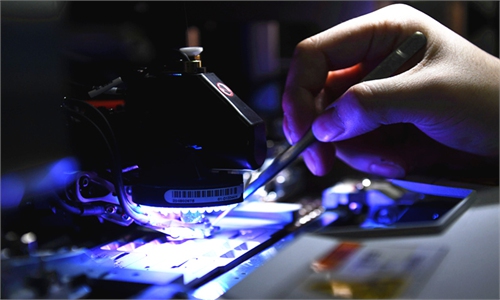
Chip Photo:VCG
Semiconductor prices have dropped sharply, especially for high-end electronic products such as mobile phones, with some dropping by 10-fold since the beginning of the year, media reported, against the backdrop of weak global demand and high market inventories.
The decline came just a year after the historic chip shortage that drove prices up to record highs. Industry insiders said that the new trend may be sustained for the rest of the year but will stabilize amid potential demand for new-energy vehicles.
Some models of chips that were once very popular last year have dropped from 200 yuan ($29.5) a unit to 20 yuan now, media reported, describing the trend as an "avalanche" for the chip market.
A manager surnamed Wang with Yangzhou Yangjie Electronic Technology Co, a company involved in chip design and production, confirmed to the Global Times on Monday that chip prices have been on a downward trend this year, but the magnitude of decline differs among products.
Chip supply was inadequate last year and many producers had to turn down new orders because their production capacity reached ceiling. But this year, a significant drop in shipments of mobile phones, a major downstream field that needs high-end chips - often below 10-nanometer - has dragged down the market price.
"People used to buy a new mobile phone every 12-18 months, and now this period has expanded to three to four years," Ma Jihua, a veteran industry analyst, told the Global Times on Monday, indicating the reason for the price drop.
Another factor for the price plunge was high inventories of chips among producers that feared falling victim to possible US sanctions, especially after the Trump administration restricted Huawei from using US technology and software, Ma said.
"Now, the inventories are still at a fairly high level, but the demand is shrinking," the expert said.
The price falls have been exacerbated in recent months. In the field of consumer electronics, especially for many major types of chips such as panel and communication chips, the price drops have been big, with most of the prices falling by more than 20 percent in the past two months and some dropping by over 80 percent, media reported, citing Liu Xingliang, a member of the information and communication economics expert committee of the Ministry of Industry and Information Technology.
Moreover, Gartner's latest forecast suggested that overall global shipments of electronic devices such as PCs, tablets and mobile phones are expected to decline by 7.6 percent this year.
In the wake of this sluggish demand, Qualcomm Snapdragon 8 series orders dropped by about 15 percent, and the prices of its two flagship chips will reportedly be reduced by about 40 percent by the end of the year, media reported.
Zhang Yunfei, a manager with Suzhou Silicon Test System Co, a chip testing service provider, told the Global Times on Monday that because of the price drop, its orders declined sharply and the prospects will worsen in the second half of the year, with a forecast drop of 15-20 percent compared with the first half of the year.
"But the price change is different among products…when chips for mobile phones are depressed, those for new-energy vehicles (NEVs) are rising," Zhang said.
Latest figures from the China Passenger Car Association show that NEVs in China, its leading production base and market, bucked the trend, with both production and sales up by 120 percent year-on-year from January to July.
"NEVs often adopt 28-nm chips with relatively mature production capacity and highly independent supply chains …the stable demand for cars may help inject new momentum into the chip industry to grow," Ma said.
From traditional fuel vehicles to smart electric vehicles, the demand for chips in a vehicle has increased exponentially, AutoChips, a semiconductor-related company, based in Hefei, East China's Anhui Province, told the Global Times on Tuesday.
In terms of microcontrollers (MCUs) with the most serious core shortages, traditional fuel vehicles need about 70 chips, but smart electric vehicles need about 300 chips, AutoChips said. The company said that its MCU has already exceeded the monthly sales volume of one million units in the second half of last year.
The supply shortage of automotive chips will continue to exist in the short term, but it is mainly reflected in structural shortages, not the large-scale shortage of chips in the past, AutoChips said, expecting that with the continuous release of automotive chip production capacity and the continuous improvement of market mechanisms, the shortage of supply in the global automotive chip market will gradually ease in 2023.



